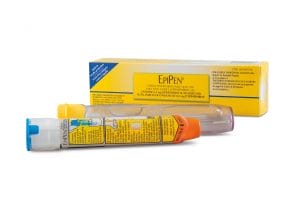 While the FDA estimated that the shortage of the EpiPen and two generic epinephrine auto-injectors would be “short-term,” a major organization of pharmacists reports that some U.S. pharmacies are still unable to get sufficient stock of the life-saving devices.
While the FDA estimated that the shortage of the EpiPen and two generic epinephrine auto-injectors would be “short-term,” a major organization of pharmacists reports that some U.S. pharmacies are still unable to get sufficient stock of the life-saving devices.
“There are still intermittent shortages of some of the epinephrine auto-injector products,” Michael Ganio, director of pharmacy practice and quality at the American Society of Health-System Pharmacists (ASHP), told Allergic Living. “Most pharmacies are able to get epinephrine auto-injectors from some manufacturers, but other products, like [Mylan’s] EpiPen, are still intermittently available.”
Anecdotally, a majority of families with food allergies seem to be able to fill their prescription. But this access varies: some people are purchasing with no issues, while others are experiencing back orders or rationing.
Several consumers tell Allergic Living that a doctor or a pharmacist has directed to them Kaléo’s Auvi-Q auto-injectors, which are not in shortage. The company is able to fill Auvi-Q orders through its direct delivery service.
In early May, both the FDA and AHSP declared a nationwide U.S. shortage of market brand leading EpiPen, EpiPen Jr and equivalent generic devices (adult- and child-size), which are distributed by Mylan NV and manufactured by Pfizer Inc. Also in shortage are the Impax Therapeutics generic epinephrine auto-injector in adult and child sizes.
“Just filled Mylan generic at Publix in Orlando with 12-month expiration this week,” wrote one Allergic Living Facebook user on July 5. Another parent in southeast Massachusetts had to wait 10 days to get an EpiPen Jr set and a parent in Fredericksburg, Virginia says EpiPens at her pharmacy have been on back order “for almost a month.”
A mother in southern California who needs two sets of EpiPen for her son was only able to get one. “I said I needed for another when school starts. They told me to come back then,” she said.
“If a patient comes to a pharmacy with a prescription for an epinephrine auto-injector product that is not available, the pharmacist typically works with the patient and the prescriber to find an alternative auto-injector product that is available,” says Ganio. If people can’t fill EpiPen prescription, ASHP says pharmacists will help find an alternative auto-injector product that is available. Ganio notes that insurance coverage is sometimes an issue. In such cases, a pharmacist usually helps to locate the device that was originally prescribed.
Additionally, Mylan encourages patients to call its 1-800-796-9526 hotline for assistance in finding a set of its devices. Pfizer Inc., which manufactures EpiPen and the Mylan generic equivalent at its Missouri facility, reiterated that it “continues to ship product; however, supplies may vary from pharmacy to pharmacy.”
Allergic Living asked Pfizer, Mylan and the FDA when the shortage is anticipated to be fully resolved, but none of them offered a timeline. “Multiple factors have resulted in limited availability of EpiPen in certain areas in the U.S., including both pharmacy-level supply disruptions and a manufacturer issue,” said Theresa Eisenman, a press officer at the FDA.
In May, Steve Danehy, Pfizer’s director of media relations, told Allergic Living “the constrained supply of EpiPen is due to supply of certain third-party components, along with process changes implemented which have temporarily limited capacity at our manufacturing facility.” On July 5, Danehy declined to comment on which component was at issue or whether the third-party issues have resolved.
Non-profit Food Allergy Research & Education (FARE) continues to gather data about auto-injector availability. It encourages people to continue to fill out this survey.
In Canada, EpiPen and EpiPen Jr devices remain in shortage “with unknown anticipated end dates,” according to Canada’s health regulator. Health Canada first announced a supply shortage of EpiPen auto-injectors in January and then expanded its warning to include the junior version of the device in April.
The FDA says it will continue to keep its Drug Shortages website updated with the latest information about epinephrine auto-injector supply.
Canadians can stay up-to-date about the shortage and estimated re-supply dates by visiting Drug Shortages Canada.
Get more news from Allergic Living to your inbox.





